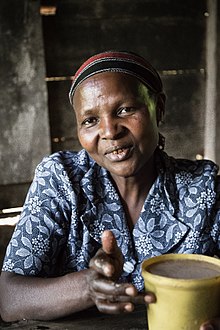Banana beer

Banana beer is an alcoholic beverage made from fermentation of mashed bananas. Sorghum, millet or maize flour are added as a source of wild yeast.[1]
URWAGWA produced mainly from the fermentation of banana juice, is the oldest and popular Rwandan tradition alcoholic making[2]
Etymology[]
In Uganda, banana beer is known as mubisi, in DR Congo as Kasiksi, in Kenya as urwaga, and in Rwanda and Burundi as urwagwa.[3]
Background[]
Banana beer is sometimes consumed during rituals and ceremonies.[4] A similar product called mwenge bigere is made in Uganda with only bananas and sorghum.[5] It can also be found under the names kasiksi, nokrars, rwabitoke, urwedensiya, urwarimu and milinda kaki.
Production[]


Banana beer is made from ripe (but not over-ripe) East African Highland bananas (Musa acuminata Colla (AAA-EA), Mbidde clone set).[6] To accelerate the ripening of bananas, a hole is dug in the ground, lined with dried banana leaves which are then set on fire. Fresh banana leaves are laid on top of them, and then the unripe bananas. These are then covered by more fresh banana leaves and pseudostems. After four to six days, the bananas are ripe enough.[1] This method only works in the dry season. During the rainy season, bananas are ripened by putting them on a hurdle near a cooking fire.[7]
There are two types of banana that are used for banana beer: the harsh tasting igikashi and the milder tasting igisahira.[8] The banana beer mixture consists of one third igikashi and two thirds igisahira. Once ripened, the bananas are peeled. If they cannot be peeled by hand, they are not ripe enough. After peeling, the bananas are kneaded until soft. The juice is then filtered to get clear banana juice, which is then diluted with water. Sorghum is ground and lightly roasted and then added to the juice. This mixture is left to ferment for 24 hours and then filtered.[6]
After filtering, the beer is packaged in glass or plastic bottles. In commercial production, the beer may first be pasteurized before packaging to stop fermentation and extend shelf life.[6]
In Rwanda, the main ingredient for making urwagwa are bananas and sorghum, production starts by crushing ripe bananas into wooden barrel known as umuvure but nowadays because of deforestation and artificial activities it is difficult to find mature trees so they use plastic sheeting instead of barrels, bananas crushed by using tradition grasses called ishinge. Crushing is done by hands or legs in some districts of Rwanda, like Kirehe they still use legs, [9]
Varieties[]
In Tanzania there is a banana beer called mbege, still brewed in a traditional way.
Commercial brands include:
- Mongozo Banana Beer
- Raha
- Agashya
See also[]
| Wikimedia Commons has media related to Banana beer. |
- Banana wine : is an other product which can be retrieved from banana and are sweet smelling homemade beverage with a light fruit flavour [10]
References[]
- ^ Jump up to: a b "Banana Beer". Xs4all.nl. Retrieved 2013-06-21.
- ^ IYAMARERE,KAYITARE , RUTABAYIRO, Innocent,Michel and Joseph (2018). Volatile aroma compounds and sensory characteristics of traditional banana wine "Urwagwa" of Rwanda. KIGALI: Rwanda Journal, Series D, Volume 2, 2018, Life and Natural Sciences: Issue I. pp. 1–24.CS1 maint: multiple names: authors list (link)
- ^ "Fermented and vegetables. A global perspective. Chapter 4". Fao.org. Retrieved 2013-06-21.
- ^ Adekunle, Julius (2007). Culture and Customs of Rwanda. Greenwood Publishing Group. ISBN 978-0-313-33177-0.
- ^ Handbook of Indigenous Fermented Foods, 2nd edition 1995 ISBN 0-8247-9352-8
- ^ Jump up to: a b c "Banana Beer | Practical Answers". Practical Action. Archived from the original on 2011-09-21. Retrieved 2013-06-21.
- ^ Appropedia:Banana beer (Practical Action Brief)
- ^ "Laisvalaikis - ZEBRA". Zebra.lt. Retrieved 2013-06-21.
- ^ "URWAGWA BANANA BEER - RWANDA". rickshawtravels.com. Retrieved 2021-03-05.
- ^ "Banana Wine Recipe - How to Make at Home and What Are the Benefits". Wine, Food and Everything Joyous in Life. 2019-04-08. Retrieved 2021-08-19.
- Beer in Africa
- Burundian cuisine
- Drugs in Burundi
- Kenyan cuisine
- Rwandan cuisine
- Tanzanian cuisine
- Ugandan cuisine
- Drugs in Rwanda
- Types of beer
- Banana drinks
